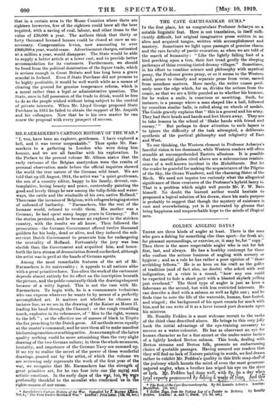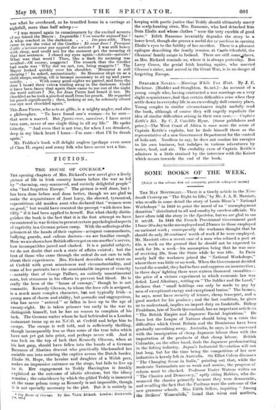GOLDEN ANGLING DAYS.t Tumix are throe kinds of angler at
least. There is the man who goes a-fishing for something else than sport—for fresh air, for pleasant surroundings, or exercise, or, it may be, for " copy." Then there is the more respectable angler who is out for fish first, last, and always. He has a healthy contempt for those who confuse the serious business of angling with scenery or hygiene ; and as a rule he has rather a poor opinion of " thoss scribbling fellows." He is as keen on his craft as the golfer of tradition (and of fact also, no doubt) who asked with real indignation, at a crisis in a round, "how any one could be expected to hole a short putt with a blasted skylark yelling just overhead." The third type of angler is just as keen a fisherman as the second, but with less restricted interests. Ho can describe a duel with a salmon as well as fight one ; and he finds time to note the life of the waterside, human, four-footed, and winged ; the background of his sport counts for much with him, and he can write of it as a lover turned poet descants upon his mistress.
Mr. Romilly Fedden is a most welcome recruit to the ranks of the third class described above. He brings to this very jolly book the initial advantage of the eye-training necessary to success as a water-colourist. He has as observant an eye for human character as for a fine sunset or the under-water tactics of a lightly hooked Breton salmon. This book, dealing with Breton streams and Breton folk, presents an embarrassing choice of quotable passages. Having assured our readers that they will find no lack of Nature painting in words, we feel drawn rather to exhibit Mr. Fedden's quality in this little snap-shot of the jealousy which haunts the mind of even the most generous. natured antler, when a brother has wiped his eye on the river or loch. *, redden had done well) with fiyv an a day wiiejl local experts pronounced 9y-fishing a svage 9( tiny+. And this
•
• ray Boo of the Cave Ornirisankarytihs. By srl inaada Acharro Loud,: 55. net.) f ddhe frons the RAIN, Loy of o Pointer in Brittany. By Ural*" Fadden. ; A, sad C. Black. Ira ed, Ileaf was what he overheard, as he trundled home in a carriage at nightfall, more than half asleep :— "I was mused again to consciousness by the excited accents of my friend the Mayor : Impossible I Cue mouche aujourd'hui 1 A whip cracked in the darkness. . . . Inc-pose-sale. Then came to me the voice of the Gristlier : Et nous done I rourquoi dinble n'avions-nous pas apporti des asticots ? I was still heavy with sleep, and could not for the moment get the meaning of that last sentence. I closed my eyes again—Asticots—asticots What was that word ? Then, like a flash its meaning was recalled—Of course, maggots! The remark that the Greffier had made was ' Why did we not, too, bring maggots ? ' The Mayor looked quickly over his shoulder. `Monsieur is still Weeping ? ' he asked, sententiously. So Monsieur slept on as a child sleeps, smiling, till it became necessary to sit up and yawn noisily. . . . With many good.nights we parted, and from the door I heard their voices trailing away in the darkness. Could it have been fancy that again them came to me out of the night the word asticots 1 No, for Jean Pierre bad heard it too. He chuckled as he took a pinch of snuff from his pouch. He regarded his pouch significantly; then, looking at me, ho solemnly closed one eye and chuckled again."
This Jean Pierre, who acts as gillie, is a mighty angler, and also a philosopher. " To have found one's woman—to be sure— that were a marvel. But fsgurez-rocs, 111011blear, I have never
been sure, never of one single thing in all my life." He spoke bitterly. "And even that is not true, for when I am drunkest, deep in my black heart I know—I'm sure—that I'll be drunk again."
Mr. Fedden's book will delight anglers (perhaps even some of Class II. supra) and many folk who have never wet a line.







































 Previous page
Previous page